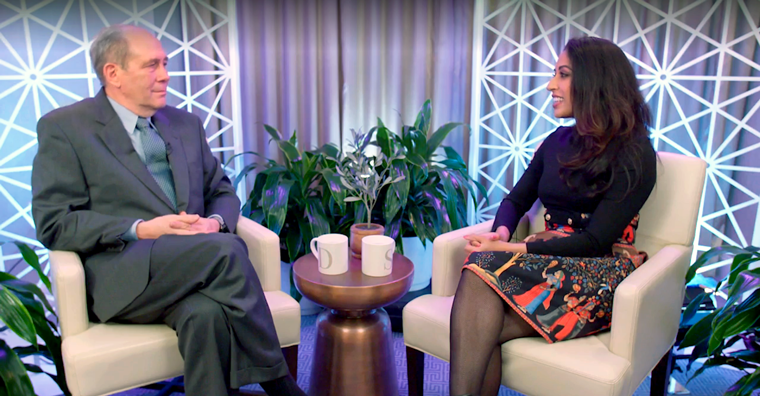
The COVID-19 pandemic has prompted numerous changes to the way rheumatologists approach their work, so it was fitting that the opening keynote presentation of ACR Convergence 2021 broke from the traditional lecture format.
With a backdrop akin to a daytime talk show, ACR President David R. Karp, MD, PhD, interviewed keynote speaker Seema Yasmin, MD, during the Opening Session on Friday, Nov. 5. Dr. Yasmin’s lecture-turned-interview was titled, The Covidization of Rheumatology: What Will or Won’t Change Beyond the COVID-19 Pandemic. The presentation and the entire Opening Session can be viewed by registered meeting participants through March 11, 2022.
Dr. Yasmin, Director of the Stanford Health Communication Initiative, previously investigated infectious disease outbreaks as an officer in the Epidemic Intelligence Service (EIS) at the U.S. Centers for Disease Control and Prevention. Her experience with the EIS transformed her outlook on how public health agencies communicate with the public.
“No matter where I was sent, no matter what contagion I was deployed to stop, it was never just a pathogen that was spreading,” she said. “There were all these rumors, health hoaxes, medical myths — so much misinformation and disinformation spreading alongside an epidemic, really fueling the epidemic — and yet we in the public health world were so singularly focused on a pathogen and not people’s beliefs about public health.”
To combat this disconnect, Dr. Yasmin pursued communications training through a journalism fellowship and is now an Emmy Award-winning journalist, recognized for her reporting on neglected diseases. She also is the author of multiple books, including the 2021 release “Viral BS: Medical Myths and Why We Fall for Them,” and has dedicated her career to connecting with patient populations “sidelined” by health and science.

“I grew up believing a ton of conspiracy theories, and that’s because my family and my community did,” said Dr. Yasmin, adding that healthcare workers need to address these influences when disseminating public health information, like the benefits of being vaccinated for COVID-19 and other diseases. “We have this focus on the science — what’s inside the vial — and not everything around it that leads someone to say, ‘I trust the government,’ ‘No, I don’t,’ ‘I have legitimate reasons,’ or ‘I’ve heard these other things.’ We’re not addressing any of that — and we’re not trained to — and I really want us to change that.”
Dr. Yasmin said the rapid development of COVID-19 vaccines perfectly illustrates the potential for divergent reactions to the same facts. Many researchers and healthcare providers were buoyed by the speed at which effective messenger RNA vaccines were made available for COVID-19, building on years of scientific innovation. Meanwhile, the same timeline spurred safety concerns and contributed to vaccine hesitancy among many in the general population.
“While we’re in the lab developing the therapeutics, developing the vaccines, concurrently we should be out there studying what people think about this process, what they understand about it, and also at the same time, developing targeted messaging for different communities,” Dr. Yasmin said. “We didn’t do that. So, we come out with these incredible, historic vaccines and then people are refusing to take them for a myriad of reasons.”
When asked by Dr. Karp whether medicine would return to “normal” after the pandemic, Dr. Yasmin questioned whether the status quo that existed before COVID-19 was a worthy goal.
“When we do exit this pandemic, when this new coronavirus becomes endemic, if we sigh a massive sigh of relief and go back to business as usual, we will have failed because the climate crisis is still here,” she said. “We still have supply chain issues, which we can talk about. We still have an epidemic of burnout and moral injury amongst healthcare workers that predates the pandemic. So, the status quo wasn’t great for the majority. Maybe it served the needs of a minority, but I don’t want to go back to that normal.”
Dr. Yasmin said she would like to see some of the changes to healthcare delivery spurred by the pandemic, such as different ways of triaging patients and caring for patients through telemedicine, become permanent to bolster day-to-day clinic operations. She also said more action is needed to safeguard provider well-being. And she called on leaders in the field to place a greater emphasis on the significance of communication among providers and with the general public.
“The most frequently used medical procedure — it’s not spinal taps, it’s not lobotomy — it’s communication, and that needs to be reflected in medical school and post-graduate medical education curriculum,” said Dr. Yasmin, who is also Clinical Assistant Professor, Stanford University Department of Medicine, and Visiting Assistant Professor of Health Crisis Communications, Anderson School of Management, University of California at Los Angeles.
REGISTER TODAY FOR ACR CONVERGENCE
If you haven’t registered for ACR Convergence 2021, register today to access all of the valuable content during the meeting, November 3–10. Registration also includes on-demand access to the virtual platform (session recordings, Poster Hall, Community Hubs, and ShowRheum) until March 11, 2022.
